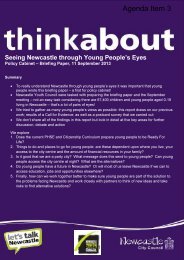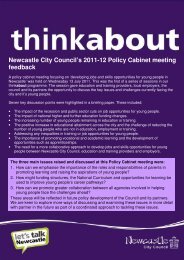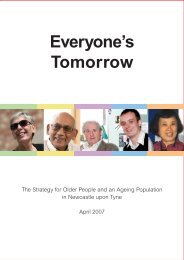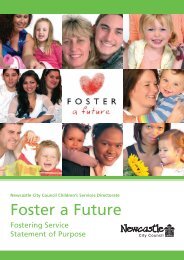NEWCASTLE'S MUSICAL HERITAGE AN INTRODUCTION By ...
NEWCASTLE'S MUSICAL HERITAGE AN INTRODUCTION By ...
NEWCASTLE'S MUSICAL HERITAGE AN INTRODUCTION By ...
Create successful ePaper yourself
Turn your PDF publications into a flip-book with our unique Google optimized e-Paper software.
herded together on hard wooden benches under the roof of the theatre in what is<br />
(or was) called ‘The Gods’. My granny, a typical Victorian, used to sit and sing to<br />
herself after a sip or two of beer. Unwittingly she introduced me, as a child to a<br />
number of Music Hall songs; ‘Come, come, come and make eyes at me down by<br />
the Old Bull and Bush, tara-la la la’ and ‘My old man said follow the van and don’t<br />
dilly dally on the way’ and a song called, ‘A Bicycle Made for Two’, which went,<br />
‘Daisy, Daisy, give me your answer do, I’m half crazy just for the love of you. – It<br />
won’t be a stylish marriage, I can’t afford a carriage, but you’ll look sweet upon<br />
the seat of a bicycle made for two’. I was too young to understand the<br />
significance of the words, but I liked the tunes – they had immediate appeal; like<br />
most working class children of the 1920s it was my introduction to the world of<br />
music.<br />
Prior to 1850, in the back rooms of public houses customers provided their<br />
own amusement and some, encouraged by their fellow drinkers, proved more<br />
entertaining than others. Enterprising publicans realising the potential for<br />
increased business in this sort of entertainment, paid professional entertainers<br />
and so Music Hall was born and flourished in the second half of the 19 th century.<br />
An alternative scenario is put forward in ‘Allens Tyneside Songs’, originally<br />
published in 1862, which might well be more relevant to the origins of the<br />
Geordie Music Hall. He states that working men were well organised and that in<br />
1827 there were 121 clubs for men and 44 for women in Newcastle and<br />
Gateshead, which acted as mutual insurance societies. There were another 50<br />
with a Christmas Club sort of function and in all over fifteen thousand people<br />
belonged to one or other of these clubs. Apart from the financial benefits each<br />
club had its head-meeting day at which a local musician or singer entertained in<br />
between the payout and the serious drinking. He goes on to say that in the<br />
previous century musicians had gone out to entertain their public and now the<br />
public began coming to them. It was the beginning of what was to become the<br />
Music Hall, and it also saw the birth of many Tyneside songs that would become<br />
known as Folksongs of The Tyne.<br />
Music Hall represented the very opposite of what those dedicated to the<br />
spread of musical culture (and not forgetting those dedicated to saving souls)<br />
were trying to achieve. As we have seen there had been a certain entertainment<br />
element in early concerts but taste and standards were being raised all the time.<br />
Music Hall, however, was a working class culture and as such it was jealously<br />
guarded. Those who embraced it were not looking to raise their cultural<br />
standards and improve their minds; they sought escapism and enjoyment. It was<br />
a safety valve for the lower classes, they could, and did, openly mimic the upper<br />
classes, as well as laugh at their own misfortunes and hardships and escape<br />
from the realities of life for a few hours. It was entertainment that asked no<br />
thought on the part of the spectator and he received his amusement without any<br />
effort to himself. It furnished variety with nothing lasting very long, therefore, it<br />
made no demands on the spectator’s ability to concentrate. It provided a<br />
comfortable seat in a classless environment at a low price and it was possible to<br />
60

















